False ceilings are a game-changer when it comes to interior aesthetics, offering endless possibilities to enhance your living spaces. In this comprehensive guide, we will explore a range of false ceiling options, from classic to contemporary, and help you navigate through their features, benefits, and suitability for different rooms.
What is a False Ceiling?
Typically constructed using lightweight materials like gypsum, metal, or PVC, false ceilings offer numerous benefits. They can conceal unsightly wirings, provide insulation, improve acoustics, and offer an opportunity for creative design elements such as lighting fixtures, patterns, or textures. False ceilings have become an integral part of modern interior design, transforming spaces with their versatility and functionality.
Recommended Reading
Some call it a faux /false ceiling while some others call it a drop/suspended ceiling. Call it what you may because there has never been a more exciting canvas in your house to play with! False ceiling designs have changed the game of home interiors.
False ceilings are often cast aside in lieu of walls and floors while decorating a space, however, we believe that they can do much more than just hide ugly pipes, wires and fittings. We are here to show you how to jazz up your ceilings with a fresh perspective.
Inspiring False Ceiling Design Ideas to Elevate Your Home
Whether you seek elegance, functionality, or a statement piece, join us on this journey as we unravel the world of false ceilings, empowering you to make informed decisions and transform your home with the perfect design that reflects your personal style and aspirations.
1. Creating Dimension: Varying Height False Ceiling
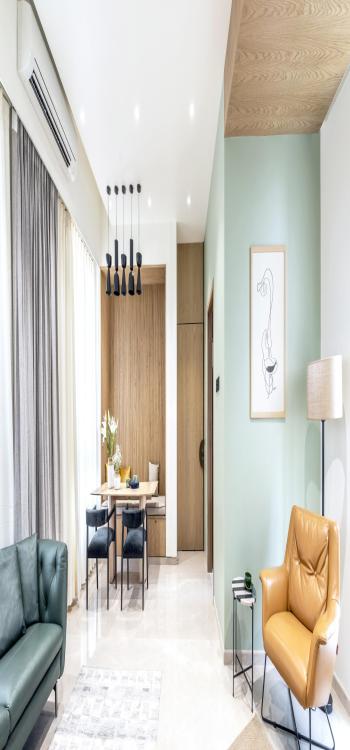
The above basic assembly can help you achieve a hierarchy in spaces with flat minimal ceilings using different heights depending on your layout. This can create an illusion of segregated areas within a room. For example, you can create a cosy nook or a corner with a shallow ceiling height that can be clad in wood.
2. Elegance in Simplicity: White False Ceiling Designs with Timeless Appeal
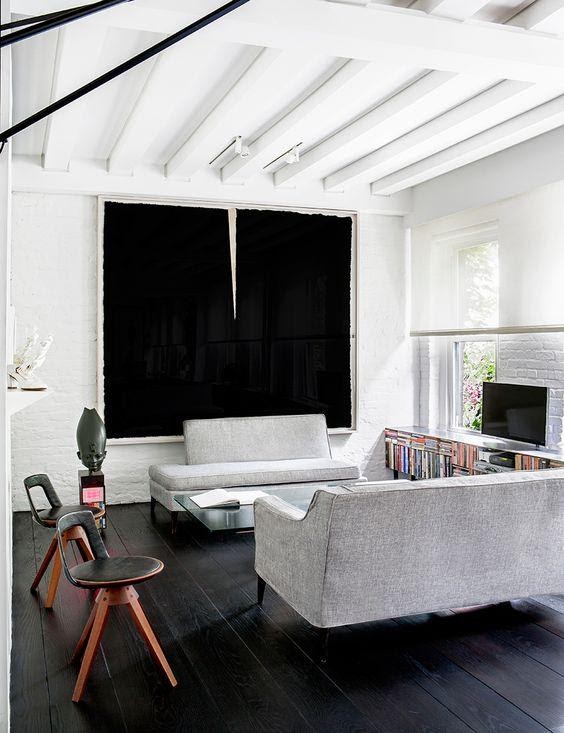
A white false ceiling design may exude an air of safety, but it is far from mundane. Embrace the potential of a monotone white ceiling with these exciting tricks that infuse it with three-dimensional excitement. Imagine a ceiling adorned with intricately textured panels, casting captivating shadows and creating an aura of tactile elegance.
3. Vibrant Masterpieces: Colourful False Ceilings that Captivate
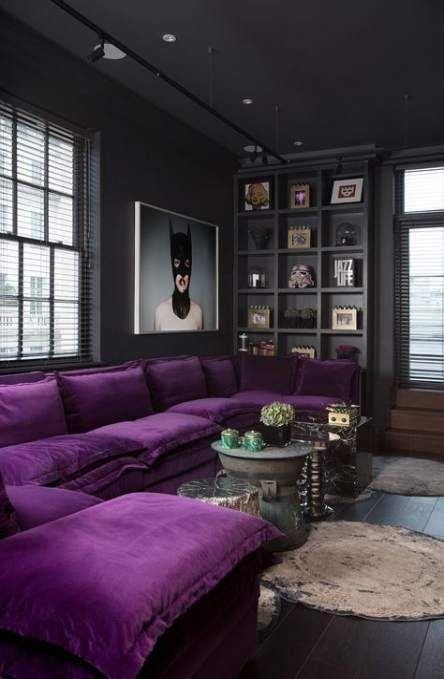
Picture a room where opulence meets sophistication, with purple-coloured pillows adorning a plush sofa, adding a touch of regal charm and vibrancy to the space.
The ambiance is further enhanced by the presence of sleek grey and black shelves, exuding a sense of modern elegance and creating a striking contrast against the backdrop of dark false ceilings. The dark false ceilings, with their mysterious allure, envelop the room in an atmosphere of depth and intimacy, allowing the shelves and decorative accents to shine. Together, these elements create a captivating and visually captivating environment, where every detail invites you to indulge in a world of refined luxury.
4. Creating an Intimate Oasis: The Power of Monotone Warmth in Ceiling and Wall Colours
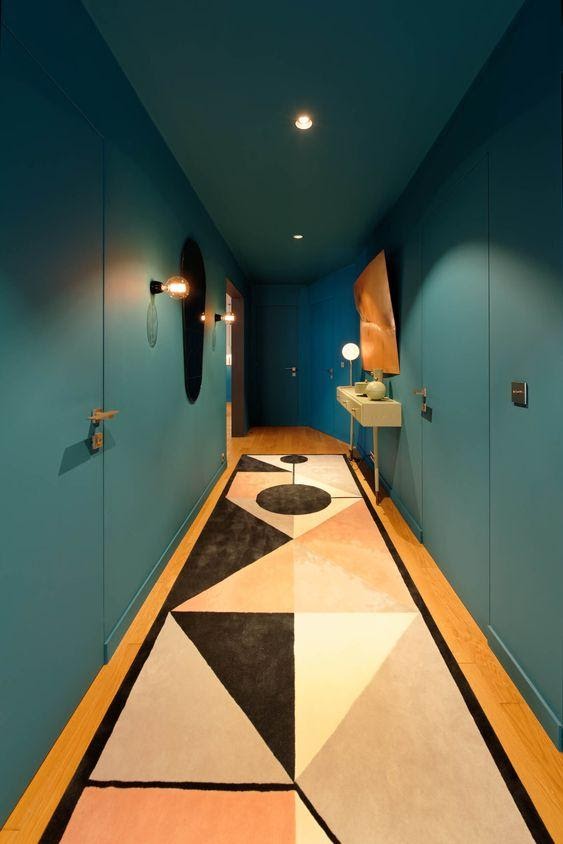
In keeping with the idea of a monotone aesthetic, you can take it a step further to create a cosy and intimate parlour effect by painting both the ceiling and walls in the same warm colour. This bold approach creates a seamless visual continuity that envelops the room, evoking a sense of comfort and intimacy. The warm hues wrap around you like a warm embrace, creating an inviting atmosphere.
5. Embracing Bohemian Charm: Rustic Faux Beams and Dark False Ceilings
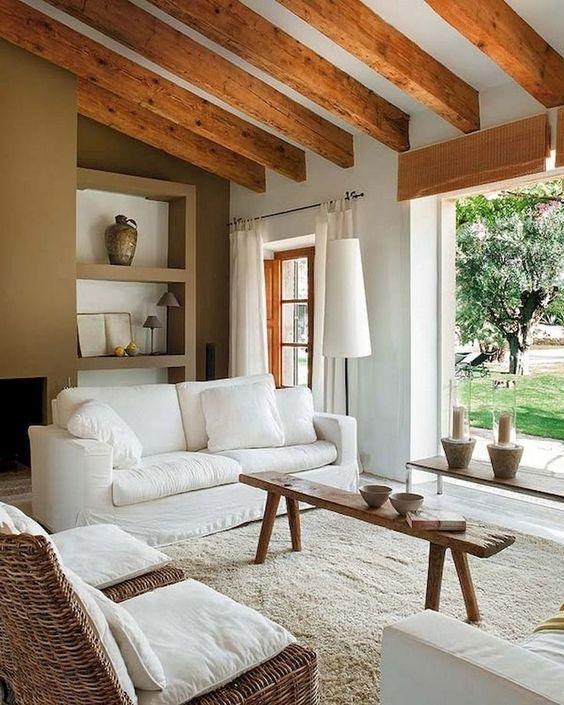
Step into a bohemian dream where rustic aesthetics meet the allure of dark false ceilings. To add an enchanting touch, seek out old timber pieces and repurpose them into faux beams. These reclaimed wood beams infuse the space with a sense of history and natural beauty, capturing the essence of bohemian charm. As the beams gracefully traverse the ceiling, they create a captivating visual impact, enhancing the room's rustic appeal.
6. False Ceiling Designs – Patterns Galore
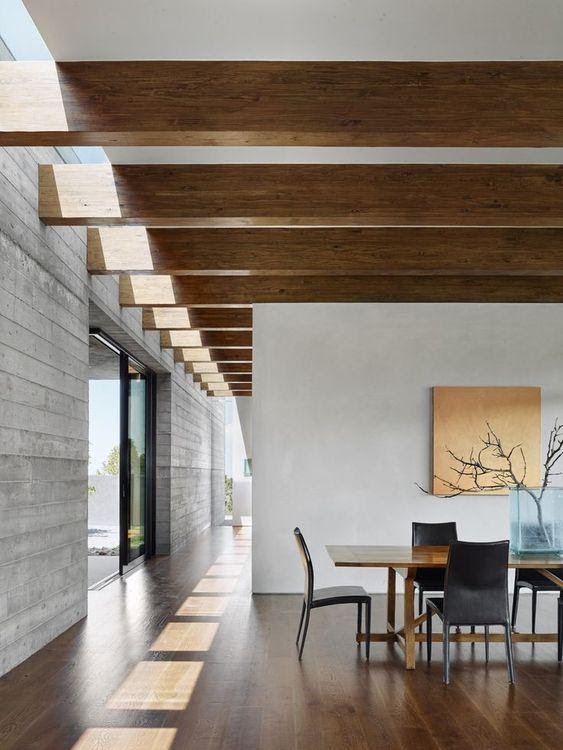
Opt for an unusual décor trick by applying wallpaper on the ceiling instead of walls. You could use texture paper with neutral tones or bold patterns and colours that can be paired with neutral walls.
7. False Ceiling Designs Cove Trove
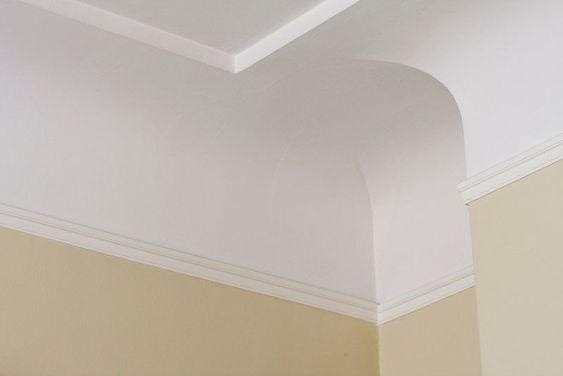
Ceiling to wall joineries is a missed opportunity to create that unique connection between the two surfaces. Use coved ceiling detail to have a seamless transition between your ceiling and walls.
False ceilings can also be used to create light coves at the wall junction for an ambient wash of light on your precious texture walls. This cove, when added along the window can be used to conceal curtain tracks, thus completely eliminating the need for unseemly pelmets and curtain rods.
8. False Ceiling Design Recesses and Drops
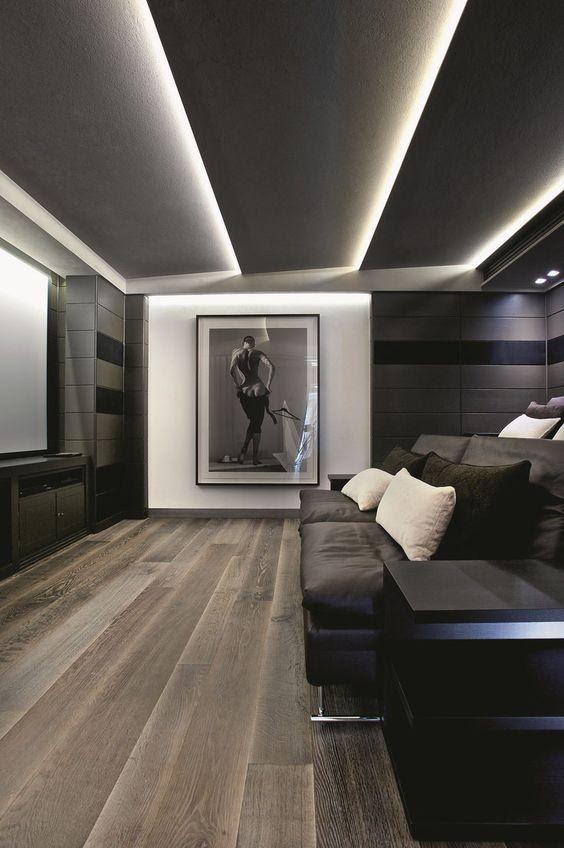
Playing with levels alone is an opportunity to add ambient concealed light to your space. The recesses and drops can be introduced in the bedrooms for minimal yet effective highlighting.
Things To Keep in Mind Before Getting a False Ceiling Done
- Easy Installation: If you’re remodelling your home, engage professionals to complete the job in one or two days. However, it is best to do these tasks before moving into a new property.
- Size and Design: It’s important to know whether you want the false ceiling design in the entire room or just near the light fixtures or around the fan. False ceilings are pricey, so factor that into your budget. In terms of designs – squares and rectangles are the most prevalent. However, there are a variety of solutions on the market.
- Height: Check the height of the ceiling before installing it because some ceilings demand more headroom than others. Prepare to reduce or increase the height by a few inches because the POP (Plaster of Paris) sheets will take up some space.
- Paint: Whitewashing all false ceilings is required. However, you can play around with different colours. Earthy tones like orange and brown make the ceiling appear heavier, giving it a more inviting appearance. White and cream are good choices if you want a crisp, clean aesthetic.
- Maintenance: It’s more than enough to mop with a sponge and sweep with a broom regularly. White-coloured ceilings, on the other hand, require periodic painting because they become dull over time.
False Ceiling Materials: The Different Types and Where to Use What
Now let's dive deeper into each material and understand their characteristics, applications, and potential pros and cons—
1. Plaster of Paris (POP)
Plaster of Paris (POP) is a popular roofing material for both commercial and residential use. POP is a powdered version of gypsum that has had its water content removed (produced by heating gypsum to a temperature where water evaporates). When water is added, it hardens and becomes a good false ceiling material.
POP is a low-maintenance, long-lasting material that also acts as cold and heat insulation. POP false ceilings can be designed in a variety of ways and can have a variety of finishes, including a uniform and smooth finish as well as a variety of shapes. It’s also a great material for boosting lighting effects. The main disadvantage of POP is its proclivity for cracking over time.
2. Gypsum
Gypsum is a calcium sulphate that is found as an evaporite mineral. Because of its thermal and sound insulation, lightweight, and fire resistance qualities, it is a popular material for artificial ceilings. It’s also a supple fabric. To create a false ceiling, square gypsum boards can be hung from an iron structure. Brown, white, red, yellow, and grey are some of the colours available in gypsum. It’s also available in transparent and colourless versions.
Finishing gypsum boards with laminates and paints can improve their aesthetic appeal. Wallpaper and texture finishes can be applied to gypsum boards. Gypsum is a versatile material that may be moulded into a variety of shapes and textures, including plain, curved, stepped, and coffered.
3. Wood
Natural patterns and textures on wooden ceilings design can be pleasing to the eye. Wooden panels can take the form of hollow blocks, boards, or panels. They’re usually simple to put together, requiring only screws and nails. They are best used in colder climates. They are long-lasting; however, they are prone to termite damage and warping. They can be finished in a variety of ways, including painting with the proper colour tones.
Because of the high cost of materials and the higher cost of upkeep, wood panels are among the most expensive panels. Wood ceiling panels, on the other hand, can provide a rich and elegant appeal to the ceiling if money isn’t an issue.
4. Fibre
The sound and heat insulation capabilities of fibre false ceilings, also known as acoustic or soundproofing ceilings, are achieved by combining natural and synthetic materials such as bitumen, tars, vegetable fibre, wood, and stone. Fibre ceiling tiles gain durability, hardness, and fire resistance as a result of the reinforcements, making them ideal for commercial applications in noisy environments such as shopping malls, retail showrooms, and offices.
Fibre artificial ceilings are becoming increasingly popular in business settings due to their low cost, ease of installation, and several practical benefits. Fibre ceiling panels, on the other hand, are not ideal for residential use due to their lack of visual appeal.
5. Glass
Glass is a good material to work with for improving the looks of a false ceiling because it is non-crystalline but transparent. It has limited applications because of its brittle nature, although the brittleness can be mitigated by adding appropriate additives.
Their transparency can be exploited to make small areas appear larger. In places like libraries, cafés, book stores, and jewellery stores, glass ceiling panels might be a good roofing option. Colour, lamination, and patterning are all design aspects that can be used to glass. Glass is also a superb heat insulator.
6. PVC
For false ceilings in garages, basements, kitchens, toilets, and bathrooms, polyvinyl chloride (PVC) is an excellent choice. PVC ceiling panels are a less expensive alternative to more expensive panels. These panels are simple to install and keep up with. They’re light and water-resistant, as well as termite resistant.
They are colourfast because they are not impacted by UV light. They can also be polished in a variety of ways, allowing for design freedom.
7. Metal
False ceilings are commonly made of metals like aluminium and galvanised iron. By their very nature, metals are tough and long-lasting. These ceiling panels are simple to install and need little upkeep. They may also be quickly removed and replaced, making them excellent for concealing water pipes, air ducts, and electric cables. Metal ceiling panels can be treated in a variety of ways to improve the ceiling’s aesthetic appeal.
8. Other Synthetic Materials
False ceilings made of fabric or synthetic leather are more decorative than useful. Because they can be made in a variety of elaborate designs to fit the rest of the furnishings, they can create a unique atmosphere. They are effective in temporary contexts such as exhibitions or festivals since they are functionally poor but aesthetically strong.
False ceilings are usually dropped ceilings, meaning they dangle from the main ceiling. Drop ceiling panels, as explained above, are used to create ceilings that are visible to individuals inside a structure or room. A stretch ceiling is a drop ceiling variation in which certain types of materials are stretched between two perimeter tracks. Ceilings may be made to come alive with a little ingenuity and innovation, given the sorts of materials that can be utilised as ceiling panels.
How is False Ceiling Cost Calculated?
When calculating the ceiling cost per square foot, several factors are taken into account. These are some major ones:
- Design: Choosing more complex ceiling designs will increase the cost.
- Size: Because the required materials can be purchased in bulk at wholesale prices, the price for a larger ceiling area is low.
- Quality: High-quality materials are more expensive. However, because high-quality materials last longer, this has a higher return on investment (ROI). Furthermore, the quality of the false ceiling has a significant impact on its durability.
- Availability: If the substances you’re using are widely accessible on the market, you can save money on transportation and logistics.
- Additional costs: include finishes, fixtures, cutting, lighting, accents, and so on.
Proper planning and installation can make or break your false ceiling design. People tend to overlook the impact of planning, but it can have a significant impact on the final outcome.
At NoBroker Interior Design Services, we understand the nitty-gritty details that go into creating flawless false ceilings. Our expert team ensures a seamless process from start to finish, leaving you with impeccable designs that will truly transform your home. So why wait? Reach out to us now and let's bring your dream false ceiling to life.

